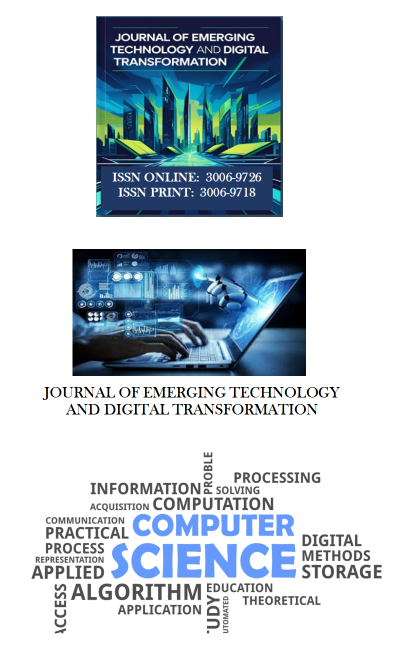
Aim and Scope
The aim of the Journal of Emerging Technology and Digital Transformation is to serve as a leading platform for the dissemination of cutting-edge research, insights, and advancements in the fields of emerging technologies and digital transformation. This journal seeks to bridge the gap between theoretical research and practical applications by providing a comprehensive understanding of the latest developments and trends in technology-driven transformation across various sectors.
Scope: The Journal of Emerging Technology and Digital Transformation covers a broad spectrum of topics within the realms of emerging technologies and digital transformation. The scope of the journal includes, but is not limited to, the following areas:
-
Emerging Technologies: This section encompasses research on novel technologies that are at the forefront of innovation, including but not limited to artificial intelligence (AI), machine learning, blockchain, Internet of Things (IoT), augmented reality (AR), virtual reality (VR), robotics, quantum computing, nanotechnology, biotechnology, and renewable energy technologies.
-
Digital Transformation Strategies: This section focuses on the strategies, methodologies, and frameworks employed by organizations to harness the potential of digital technologies for achieving strategic objectives, enhancing operational efficiency, and gaining competitive advantage. Topics may include digital business models, digital marketing strategies, digital innovation, digital entrepreneurship, and digital leadership.
-
Industry Applications: This section explores the application of emerging technologies and digital transformation initiatives across various industries and sectors, including but not limited to healthcare, finance, education, manufacturing, retail, transportation, agriculture, government, and entertainment. Case studies, best practices, and empirical research on successful implementations and challenges encountered are welcome.
-
Societal Implications: This section examines the broader societal implications of emerging technologies and digital transformation, including ethical, legal, social, and environmental considerations. Topics may include data privacy and security, digital ethics, algorithmic bias, digital divide, sustainability, and the future of work in the age of automation.
-
Policy and Regulation: This section delves into the policy frameworks, regulatory issues, and governance structures surrounding emerging technologies and digital transformation at local, national, and international levels. Discussions may include regulatory challenges, policy recommendations, and the role of government in fostering innovation while ensuring accountability and responsible use of technology.
-
Interdisciplinary Perspectives: This section encourages interdisciplinary research that integrates insights from various disciplines, such as computer science, engineering, business, economics, sociology, psychology, law, ethics, and public policy, to provide holistic perspectives on the complex interactions between technology and society.
The Journal of Emerging Technology and Digital Transformation welcomes original research articles, review papers, case studies, conceptual papers, and opinion pieces from researchers, academics, practitioners, policymakers, and industry experts. Our goal is to foster dialogue, collaboration, and knowledge exchange among stakeholders interested in the transformative potential of emerging technologies and digital innovation.










